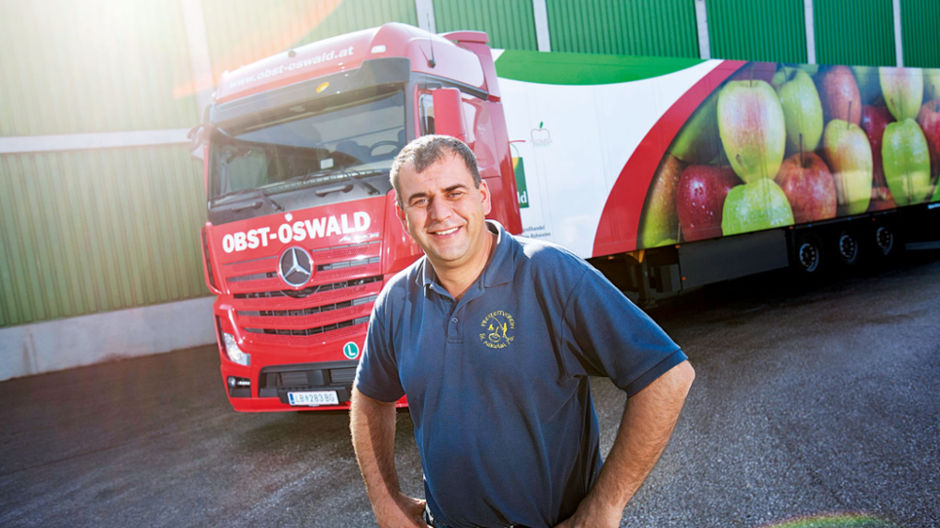
The Fritz Oswald company and its juicy load
Vehicle & technology
Fritz Oswald GmbH has been marketing Styrian fruit, vegetables and forest fruits for almost five decades. Since 2013, they have been transporting their products in a new Actros.

Driver Othmar Ulbl is prepared for flexible working hours. "It has advantages too," he says.
Maierhof is located just past Kaindorf and Fresing: continue about
three kilometres after Hollersbach, following the Sulm valley road,
and you will reach your destination shortly before Gleinstätten. Why
is that important? Because this unassuming south Styrian village is
the location of Fritz Oswald GmbH, one of the largest companies in the
region. The family firm supplies supermarket chains, distilleries,
wholesalers and food manufacturers with fresh fruit, vegetables,
forest fruits and frozen produce, employing a staff of between 80 to
90 people. Recently, a latest generation Actros 1845 LS was added to
the company fleet.
"It's been in operation since
July," says its driver Othmar Ulbl, "and so far I'm really
pleased with it." What Ulbl particularly likes is the
high-quality interior, the height of the driver's cab, the comfortable
bed and the generous storage space. "Not to mention the auxiliary
air conditioning and heating," says Ulbl. "When it gets
really hot in the summer or particularly cold in the winter, it's a
luxury you can't underestimate." The 39-year-old driver climbs up
the steps into his cab; he has to take 33 Euro-pallets with empty
containers from the company depot in Maierhof to the second company
location at Prebensdorf near Gleisdorf – the cargo has already been
loaded and secured with fixing rails. "So that nothing
slips," says Ulbl: safety first is the priority.
Fritz Oswald junior, who now runs the company together with his brother Günter as the second generation of management whilst also being responsible for the fleet, agrees. "As company director, of course I value the reliability and the high standards of Mercedes vehicles, but at the same time we have to look at consumption, which is why we signed a FleetBoard contract with Mercedes-Benz." Depending on the resulting figures, the company director will then decide whether to acquire further Mercedes trucks.
As a rule, each vehicle in the Oswald fleet is replaced by a new one every six years. "Of course, one litre more or less of fuel consumed per 100 kilometres makes an enormous difference in that time," says the company boss. Up until now the figures have been excellent, however, as Othmar Ulbl tells us en route to Prebensdorf, not without a certain pride. "At least the Mercedes rep was happy last time," says the driver with a smile. Currently, the average consumption is approximately 28 litres. "After you have driven 34,000 kilometres that makes quite a difference," says Ulbl, who drives almost 100,000 kilometres per year. Most of these he covers on national roads. "We only very occasionally deliver to southern Germany or Italy," says Fritz Oswald.
Depending on the cargo and the distance, there are between eight and twelve customers on Ulbl's list for the day. The time he starts work in the morning also depends on these two factors. "That often varies, which is not always easy – especially if you have a young family. But that is part of the job." He mainly drives at night. "So that the products reach the customer as fresh as possible. If we deliver to the wholesale depots of the supermarket chains at night, they can stack them in the shelves in the early morning."
In order to transport fresh and frozen goods at the same time, most of Oswald's trucks have two temperature zones which can be adjusted for fresh and frozen produce. Also, the partition wall is freely movable – so the two zones can be flexibly sized, depending on the cargo and the order placed.
That is not necessary today. Ulbl has arrived in Prebensdorf in bright sunshine and now he has to unload the empty containers with a fork-lift truck, after which he has to take a number of pallets of pre-sorted apples and chestnuts on board to be packed in Maierhof. He expertly steers the yellow transport truck between high columns of crates. Just around the corner, members of staff have already placed several crates of washed apples, sorted by size, colour and quality, ready for him.
A few metres away, a dozen women in green work overalls stack layers of apples in crates for a local supermarket chain. They are all wearing protective head coverings for reasons of hygiene, and on entering the building Ulbl also has to put on a protective cap. "When you are working with food, the rules are particularly strict," he says, loading the produce while he is talking.
Then it's back to Maierhof. Ulbl will not find out where he is going after that until he arrives. He will probably be delivering to a local discount store in Carinthia. "That would work out well as regards time," says the Styrian driver. "But we'll wait and see what the boss has got planned for me. It might be a completely different round. I've always got a change of clothes with me, some snack food, toiletries and a towel, just in case."
He has been working for the company for ten years, so Ulbl has become used to the flexible working hours. "You get used to it," he says, "and though lots of people don't believe it: the working hours have their advantages too. If you're doing a long journey, you clock up lots of hours and then you can enjoy a long weekend." That's a luxury that many of his friends don't have.
Photos: Bubu Dujmic



Comment
Please log in to post a comment.
No comments yet